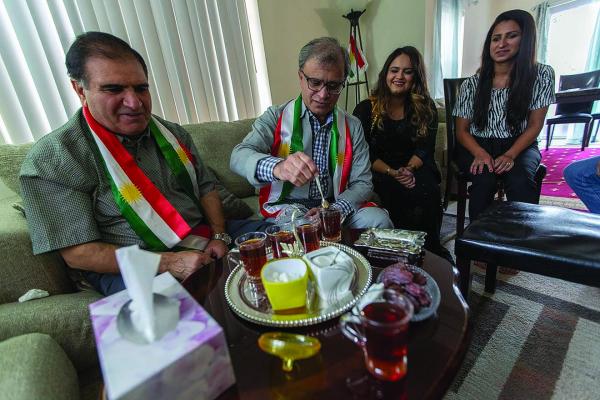October 24, 2019

The Osman family, (l-r) Omar, son Delshad, and daughters Shawnam and Ala, enjoy afternoon tea at their home in Harbor Point, Dorchester. Jesse Costa/WBUR photo
Surrounded by family, with a scarf flashing the colors of Kurdistan draped across his chest, Kurdish war veteran Omar Osman Omer recalled life before coming to the United States more than 20 years ago. From the age of 19, he spent 13 years battling the Iraqi government as a Peshmerga fighter, struggling for freedoms like the ability to speak the language he now speaks at his home in Dorchester.
“The ideology behind the freedom fighters was that we wanted peace, democracy – and our basic rights were violated by the Iraqi regime,” Omer said in Kurdish that was translated by his 44-year-old son, Delshad Osman.
But Omer, 65, eventually left Iraq to find democracy elsewhere and after a decade-long journey, he and his family landed in Dorchester’s Harbor Point neighborhood.
In an interview, Omer noted that the Peshmerga revolution of the 1980s was crushed by Saddam Hussein, who infamously used chemical weapons against the Kurds. He then moved his family to Pakistan, where they lived as refugees for nine years, before being selected for resettlement in the United States. Their first homes were in Chelsea and Roxbury, and in 1998 they settled in Harbor Point.
Living in the US, Omer said, means his family can enjoy the ideals he fought for as a member of the Peshmerga, the Iraqi Kurdish military organization whose name means “those who face death.” But, he added, that freedom is bittersweet with Kurds in Syria facing an aggressive military invasion by Turkish forces.
“We have the freedom, democracy here in United States,” Omer said. “But back in my country ... people are still fighting for those things. So I know the pain that my people are suffering ... it’s just unbearable.”
A focus on education
Roughly 500 Kurdish families are spread throughout New England, according to the New England Kurdish Association whose co-founder, Seyhmus Yuksekkaya, said the greatest number are from Iraq, followed by Turkey, Syria ,and Iran.
While most of the first-generation Kurds have gone directly to jobs and starting businesses, Yuksekkaya said, nearly everyone he knows among the younger generation is focused on education.
“Overall the education is very important to the first generation, because they probably didn’t have a chance,” he said. “So they send their children to school, and they’re very disciplined about it.”
Patterns of Kurdish immigration have been tied to international conflicts, including the US invasion of Iraq and activity in what Yuksekkaya calls the Syrian part of Kurdistan. Most of Boston’s Kurds are from Iraq, he said, while a Kurdish community in Worcester comes from Syria.
But Yuksekkaya, who is from Turkey, said the arrival of Kurds in the US has grounded to a halt over the last three years. He pointed to the Trump administration’s antagonism toward refugees as the reason why.
“A Kurd is safe anywhere but Kurdistan,” he said. “If you are outside of Kurdistan, you’re probably more successful than inside Kurdistan because of the discrimination, because of the state terror ... if you refuse to assimilate and attempt to live like a Kurd.”
A Kurdish village in Dorchester
After the first Kurdish family came to the Harbor Point apartments, Omer’s son Delshad said, a manager at the development encouraged federal authorities to direct more families to Dorchester. Now, he added, there are nearly 30 Kurdish families living along the waterfront. “And so that’s how we became a village of Kurdish community here,” he said. “We call it a Kurdish village.”
Omer has six children — all but one of whom has graduated from college — and nine grandchildren. While life is good in Dorchester, the entire family is distraught over events unfolding now in the north of Syria.
When President Trump announced he was pulling troops from that region, he left the Kurdish militias — strong allies who’d helped defeat ISIS and reportedly lost some 11,000 lives in the fighting – to fend for themselves against a vastly superior Turkish military and other Syrian militias. Many Kurds and those sympathetic with their cause, including some in Massachusetts, described Trump’s pullout as a stab in the back.
Shawnum Osman, 27, is one of Omer’s four daughters. She said she reacted to Trump’s move with “complete shock. Given the history of the way that the Turkish state ... has treated the Kurds in Turkey, I knew that it was not going to be good, and that it was just a matter of time before Turkey was going to act,” she said. “And they wasted no time, in fact, and began their offensive.”
Shawnum, who recently got her law degree from Northeastern University, and is now waiting for the results of her bar exam, said the plight of the Kurds in Syria fills her thoughts each day.
“I’m still proud to be an American Kurd, and I think that with administration changes and with shifts and pendulum changes, we’ve seen that America is an ally of the Kurds,” she said. “It’s just that this time in history has proven otherwise.”
She added that it’s heartening to hear opposition to Trump’s abandonment of the Kurds from both Democrats and Republicans. And she hopes the 2020 election will bring a new president, and the restoration of the US alliance with the Kurds.
This story was published on Oct. 21 by WBUR 90.9FM, Boston’s NPR News Station. WBUR and the Reporter have a media partnership and share content. WBUR reporter Simón Rios is based in the Dorchester Reporter’s newsroom.


